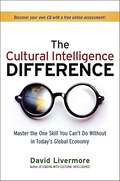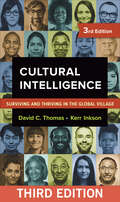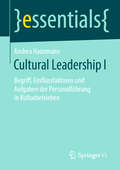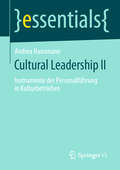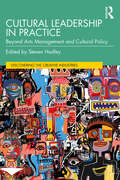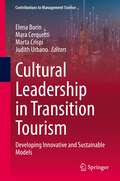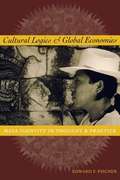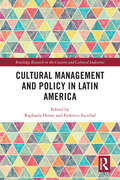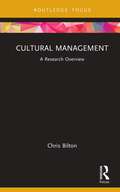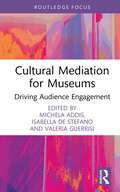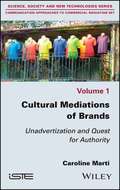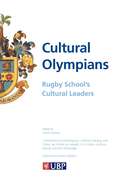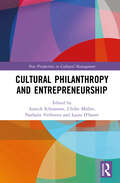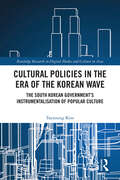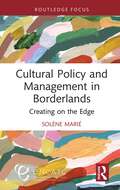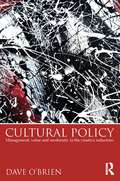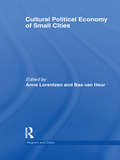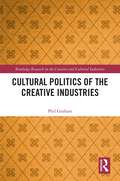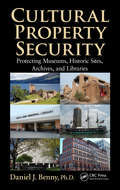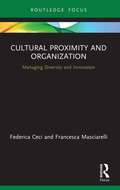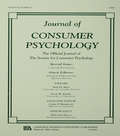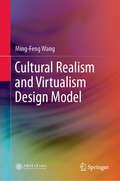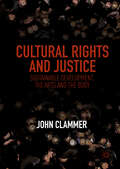- Table View
- List View
Cultural Intelligence: Master the One Skill You Can't Do Without in Today's Global Economy
by David A. LivermoreAs an award-winning author and global business leader, David Livermore applies his social science and cultural intelligence (CQ) expertise to teach others how to thrive in increasingly multicultural workplaces and a globalized world. Now, in this essential book, he shows you how to leverage the benefits of cultural intelligence for themselves--including improved decision-making, negotiation, networking, and leadership skills--to gain a crucial advantage in the crowded job market. <P><P> In The Cultural Intelligence Difference, you’ll explore: customized strategies for improving interactions with people from diverse cultures, new findings on the bottom-line benefits of cultural intelligence, and many examples of major organizations that use CQ to achieve success. Most people know that some basic cultural sensitivity is important. But few have developed the deep cultural intelligence needed to truly bridge the cultural gaps that exist in every workplace. <P><P> The Cultural Intelligence Difference delivers a powerful tool for navigating today's work world with finesse--and success.
Cultural Intelligence: Surviving and Thriving in the Global Village
by David C. Thomas Kerr C. InksonSucceed in Any Culture, in Every Situation In today's global economy, the ability to interact effectively across cultures is a fundamental job requirement for just about everyone. But it's impossible to learn the customs and traits of every single culture. David Thomas and Kerr Inkson present a universal set of techniques and people skills that will allow you to adapt quickly to, and thrive in, any cultural environment. You'll learn to discard your own culturally based assumptions and pay careful attention, in a mindful and creative way, to cues in cross-cultural situations. The authors show how to apply cultural intelligence in a series of specific situations: making decisions; communicating, negotiating, and resolving conflicts; leading and motivating others; and designing, managing, and contributing to multicultural groups and teams. This extensively revised third edition has been updated with new stories showing cultural intelligence in action. Thomas and Inkson have broadened the focus beyond business to include organizations of all kinds—nonprofits, governments, educational institutions, and more. And they include a reliable and valid measure of cultural intelligence based on a decade of research by an international team of scholars.
Cultural Leadership I: Begriff, Einflussfaktoren und Aufgaben der Personalführung in Kulturbetrieben (essentials)
by Andrea HausmannKompakt, fundiert und praxisnah werden in diesem Buch die wichtigsten Aufgaben, Besonderheiten und Herausforderungen von Führung in Kulturbetrieben behandelt. Andrea Hausmann stellt dafür zunächst den Begriff und das Grundmodell von Führung vor. Danach präsentiert sie einen Kurzüberblick zur theoretischen Verortung und beleuchtet praxisnah typische Einflussfaktoren auf Führung in Kulturbetrieben. Im Weiteren diskutiert die Autorin die Aufgaben von Führungskräften und analysiert die Rahmenbedingungen für Motivation. Im Mittelpunkt steht dabei die Auffassung, dass Führung alle Beschäftigten in Kulturbetrieben betrifft.Die Autorin: Prof. Dr. Andrea Hausmann ist Professorin am Institut für Kulturmanagement der Pädagogischen Hochschule Ludwigsburg und berät Kulturbetriebe in den Themen Marketing und Personal.
Cultural Leadership II: Instrumente der Personalführung in Kulturbetrieben (essentials)
by Andrea HausmannDieses essential vermittelt kompakt und praxisnah, welche Instrumente Führungskräfte konkret einsetzen können, um Personal in Kulturbetrieben erfolgreich zu führen. Skizziert werden dabei zum einen direkte Führungsinstrumente mit dem Fokus Kommunikation, die in konkreten Führungssituationen wirken und individuell auszugestalten sind. Zum anderen werden indirekte Instrumente mit dem Fokus Koordination vorgestellt, die weitgehend standardisiert zur Verfügung stehen und Kulturbetrieben dabei helfen, den organisationalen Rahmen für Führung zu schaffen. Die Ausführungen werden ergänzt durch Überlegungen zu Merkmalen des Führungsverhalten und Führungserfolgs. Zugrundeliegend ist dabei die Auffassung, dass für gelingende Führung alle Beschäftigten in Kulturbetrieben verantwortlich sind, d.h. sowohl Führende als auch Geführte.Die Autorin:Prof. Dr. Andrea Hausmann ist Professorin am Institut für Kulturmanagement der Pädagogischen Hochschule Ludwigsburg und berät Kulturbetriebe in den Themen Personal, Kulturtourismus und Marketing.
Cultural Leadership in Practice: Beyond Arts Management and Cultural Policy (Discovering the Creative Industries)
by Steven HadleyWhat do cultural leaders really think about the problems they, and the arts and cultural sector, face? This book brings global leaders in the cultural field into dialogue with academics and experts to offer profound insight and perspectives on the complex issues the cultural sector faces in a rapidly accelerating and destabilising twenty-first century context.The book engages directly with leaders in the arts and cultural sector, bridging the gap between academia, policy and practice. Each chapter sheds new light on national cultural policy contexts, offering different perspectives on arts subsidy, audiences, the cultural workforce, heritage, artform development and how cultural leadership functions in a fast-changing local, national and international context. Interviews are conducted by academics and experts with significant knowledge and understanding of the arts management and cultural policy field, who ask critical and probing questions. Featuring interviews with an impressively international range of senior figures from the cultural sector, from the Royal Opera House, BMW, Bloomberg and Onassis Foundation and covering countries including the UK, Germany, Chile, Singapore, Greece, USA, Serbia and Ireland, the book gives a truly global overview of cultural leadership from leaders who are open to question, critique and challenge. Each chapter offers a unique and fascinating insight into the mind of a leader in their field, with their experience ranging from huge participatory events featuring tens of thousands of people to the visual arts, opera, the Turner Prize and the #blacklivesmatter movement.This book will be essential reading for reflective cultural leaders around the world, as well as a useful resource for students and scholars involved with arts and cultural management and policy.
Cultural Leadership in Transition Tourism: Developing Innovative and Sustainable Models (Contributions to Management Science)
by Elena Borin Mara Cerquetti Marta Crispí Judith UrbanoCultural tourism has proved to be a significant source of economic development for cultural destinations, but it has also emerged as a sometimes potentially controversial and unsustainable phenomenon. The recent pandemic has also pointed out that we need different models of development of tourism, that include a more balanced approach to cultural components in cities and rural areas. Calls have been made on the need to design more sustainable models of tourism development for cultural destinations, conceiving tourism as a means to increasing the quality of life and generating economic opportunities in cities and regions by involving their communities and stakeholders. This book presents an in-depth analysis of the transition towards more sustainable models of cultural tourism development. Starting from the ongoing debate on cultural ecosystems, the book explores the potential key role of cultural and creative organizations as leaders of change. Including theoretical contributions, quantitative and qualitative analyses and international case studies, the book explores the role of cultural actors as leaders and their potential as drivers of culture-led innovation for tourism in cities and regions.
Cultural Logics and Global Economies: Maya Identity in Thought and Practice
by Fischer Edward F.Drawing on recent theories from cognitive studies, interpretive ethnography, and political economy, Edward F. Fischer looks at individual Maya activists and local cultures, as well as changing national and international power relations, to understand how ethnic identities are constructed and expressed in the modern world. At the global level, he shows how structural shifts in international relations have opened new venues of ethnic expression for Guatemala's majority Maya population. At the local level, he examines the processes of identity construction in two Kaqchikel Maya towns, Tecpán and Patzún, and shows how divergent local norms result in different conceptions and expressions of Maya-ness, which nonetheless share certain fundamental similarities with the larger pan-Maya project. Tying these levels of analysis together, Fischer argues that open-ended Maya "cultural logics" condition the ways in which Maya individuals (national leaders and rural masses alike) creatively express their identity in a rapidly changing world.
Cultural Management and Policy in Latin America (Routledge Research in the Creative and Cultural Industries)
by Raphaela Henze and Federico EscribalCultural Management and Policy in Latin America provides in-depth insights into the education and training of cultural managers from interdisciplinary and comparative perspectives. The book focuses on the effects of neoliberalism on cultural policies across the region, and questions how cultural managers in Latin America deal not only with contemporary political challenges but also with the omnipresent legacy of colonialism. In doing so, it unpacks the methods, formats, and narratives employed. Reflecting on emerging and contemporary research topics, the book analyses the key literature and scholarly contexts to identify impacts in the region and beyond. The volume provides scholars, students and reflective practitioners with a comprehensive resource on international cultural management that helps to overcome Western-centric methods and theories.
Cultural Management: A Research Overview (ISSN)
by Chris BiltonThis shortform book tells the research story of cultural management, helping scholars to analyse and combine theoretical models into an approach of their own.Cultural management emerged and developed out of the field of arts management in the 1980s, which imported managerial techniques and assumptions from mainstream commercial business into the arts. In the late 1990s, the field integrated entrepreneurial approaches to management in the creative industries before adapting to a new model, based on user experiences and co-creation. These historical phases are theorised respectively as cultural management 1.0, cultural management 2.0 and cultural management 3.0. Yet they also overlap. Bringing together theories of management and creativity, this book enables scholars to get a grip on the underlying assumptions and conditions which lie behind an eclectic and evolving field. The author, an established expert in this field, empowers scholars and reflective practitioners to develop their own approach to cultural management, drawing on the available approaches, and to recognise that successful cultural management is contingent on understanding the context (organisational and personal) within which these models will be applied.
Cultural Management: A Research Overview (State of the Art in Business Research)
by Chris BiltonThis shortform book tells the research story of cultural management, helping scholars to analyse and combine theoretical models into an approach of their own. Cultural management emerged and developed out of the field of arts management in the 1980s, which imported managerial techniques and assumptions from mainstream commercial business into the arts. In the late 1990s, the field integrated entrepreneurial approaches to management in the creative industries before adapting to a new model, based on user experiences and co-creation. These historical phases are theorised respectively as cultural management 1.0, cultural management 2.0 and cultural management 3.0. Yet they also overlap. Bringing together theories of management and creativity, this book enables scholars to get a grip on the underlying assumptions and conditions which lie behind an eclectic and evolving field. The author, an established expert in this field, empowers scholars and reflective practitioners to develop their own approach to cultural management, drawing on the available approaches, and to recognise that successful cultural management is contingent on understanding the context (organisational and personal) within which these models will be applied.
Cultural Mediation for Museums: Driving Audience Engagement (Routledge Focus on the Global Creative Economy)
by Michela Addis Valeria Guerrisi Isabella De StefanoThis book presents an innovative application of strategic and experiential marketing in the museum sector, which uses a new cultural mediation model to enrich the visitor experience via increased audience engagement. Leveraging a case study of the National Gallery of Modern and Contemporary Arts in Rome, the book helps readers understand how to apply marketing management to cultural mediation, enabling museums to segment the visitors’ market to drive improvements to arts accessibility and engagement. By running a comprehensive and multi-method research project, the authors propose a customized cultural mediation model to support museums in facing the current challenges and build their future. Our model supports museums in segmenting the visitors’ market and designing cultural mediation for enriched visitor experiences; readers will also learn how to invest, manage, hire, and train staff members devoted to this service, resulting in more engaging and successful experiences. This book will be a valuable resource for educational services offices at museums worldwide. This book will also be of interest to researchers, academics, and scholars carrying out research in the fields of museum management, cultural mediation and communication, and marketing.
Cultural Mediations of Brands: Unadvertization and Quest for Authority
by Caroline MartiBrands, which are major economic entities and major symbols of market mediations, are increasingly appearing in the social arena as cultural actors in their own right. Their quest for social legitimacy and to have control over the markets goes beyond the usual framework of their communication with initiatives that have begun to have an impact on the French cultural landscape. Media, digital content, educational kits, museum exhibitions and so on are the actions of an unadvertization, which has the potential to transform not only the rapport brands have with the public but also representations of knowledge and culture. The communicative approach at the heart of this book illuminates the contemporary transformations of communication, highlighting three main types of cultural mediations: media, education, and cultural heritage institutions. Cultural Mediations of Brands thus provides a theoretical and critical analysis of the brand and the symbolic effectiveness attributed to it.
Cultural Olympians: Rugby School's Cultural Leaders
by John Clarke John Taylor Rowan Williams Jay Winter Anthony Kenny Ian Hesketh Andrew Vincent David Boucher John Witheridge David Urquhart Robin Poidevin A N Wilson A C Grayling Patrick DerhamThis book is designed to provide a rigorous yet practical engagement with key questions surrounding faith, philosophy, science, culture and social progress by celebrating the life and thought of Rugbeian cultural leaders, social pioneers and educationalists, with an exploration of their continued relevance to contemporary discussions. Some of the most distinguished historians, philosophers and social and religious commentators among them, including AN Wilson, John Clarke, AC Grayling, TH Green, Andrew Vincent and John Witheridge, here set out, argue and explore the most important values that guide and challenge us today.
Cultural Philanthropy and Entrepreneurship (New Perspectives in Cultural Management)
by Annick Schramme, Ulrike Müller, Nathalie Verboven and Laura D’hooreThe continuing pressure on the funding of arts and culture across Europe is forcing cultural organisations to rethink their traditional ways of working. This book examines how an entrepreneurial cultural organisation can generate a form of cultural philanthropy as a viable source of alternative funding.The authors in the book address issues that include how to build trust and the language of the cultural entrepreneur; how to create and develop sustainable partnerships; and overcoming the dominant logic of cultural organisations as an obstacle in an engaged collaboration with private partners.Through expert insights and a comprehensive analysis of real-life case interviews, this book offers fresh perspectives on the challenges and opportunities inherent in cultural philanthropy. It provides invaluable insights for scholars and practitioners alike offering a multidisciplinary exploration from historical, legal, and management viewpoints within the arts sector.
Cultural Policies in the Era of the Korean Wave: The South Korean Government's Instrumentalisation of Popular Culture (Routledge Research in Digital Media and Culture in Asia)
by Taeyoung KimCultural Policies in the Era of the Korean Wave explores how the state instrumentalises cultural industries, despite the bulk of their production and delivery mechanisms becoming subject to the market logic and foreign stakeholders, through an in-depth study of the South Korean government’s cultural industry policies.Drawing on interviews with policymakers and producers in the Korean film, music, and television industries, it investigates how the government’s policy schemes—ranging from funding programmes and public agencies established to promote cultural industries to the blacklisting of those opposing the administration’s political agendas—demonstrate the government’s strong desire to influence cultural production. The findings highlight how the state retains political power to instrumentalise cultural products, even as market forces shape production mechanisms and genre characteristics that have become increasingly transnational.This book sheds new light on how the state approves and reappropriates the doctrines of neoliberal globalisation to serve its interests in instrumentalising culture, making it relevant for scholars and students in the areas of media and cultural policy, media and cultural industries, global media, and Asian studies.
Cultural Policy and Management in Borderlands: Creating on the Edge (ENCATC Advances in Cultural Management and Policy)
by Solène MariéThis book uncovers the processes at play in the development of cultural policies, projects and networks in spaces at the edge of their countries, marked by their proximity with a borderline.On a subject which is studied mainly in North America and Western Europe and based on individual case studies, its originality lies in offering a comparative view on the subject, as well as in comparing a European case – the France-Germany borderlands – to a South American case – the Brazil-Uruguay borderlands. Through a multi-sited ethnographic study, the author develops an analysis of the formal and informal processes and networks which sustain this cultural action, looking at the relative contribution of processes led by institutions, cultural agents and the civil society.This book provides theoretical tools for the analysis of the way cultural ecosystems function in borderlands and is valuable reading for scholars of cultural policy, geography and arts management.
Cultural Policy: Management, Value and Modernity in the Creative Industries
by Dave O'BrienContemporary society is complex; governed and administered by a range of contradictory policies, practices and techniques. Nowhere are these contradictions more keenly felt than in cultural policy. This book uses insights from a range of disciplines to aid the reader in understanding contemporary cultural policy. Drawing on a range of case studies, including analysis of the reality of work in the creative industries, urban regeneration and current government cultural policy in the UK, the book discusses the idea of value in the cultural sector, showing how value plays out in cultural organizations. Uniquely, the book crosses disciplinary boundaries to present a thorough introduction to the subject. As a result, the book will be of interest to a range of scholars across arts management, public and nonprofit management, cultural studies, sociology and political science. It will also be essential reading for those working in the arts, culture and public policy.
Cultural Political Economy of Small Cities (Regions And Cities Ser.)
by Bas Van Heur Anne LorentzenThe volume highlights ongoing changes in the political economy of small cities in relation to the field of culture and leisure. Culture and leisure are focal points both to local entrepreneurship and to planning by city governments, which means that these developments are subject to market dynamics as well as to political discourse and action. Public-private partnerships as well as conflicts of interests characterise the field, and a major issue related to the strategic development of culture and leisure is the balance between market and welfare. This field is gaining importance in most cities today in planning, production and consumption, but to the extent that these changes have drawn academic attention it has focused on large, metropolitan areas and on creative clusters and flagship high culture projects. Smaller cities and their often substantively different cultural strategies have been largely ignored, thus leading to a huge gap in our knowledge on contemporary urban change. By bringing together a number of case studies as well as theoretical reflections on the cultural political economy of small cities, this volume contributes to an emerging small cities research agenda and to the development of policy-relevant expertise that is sensitive to place-specific cultural dynamics. In taking this approach, the volume hopes to contribute to emerging research on culture and leisure economies by developing a differentiated spatial dimension to it, without which sustainable urban strategies cannot be developed. This book integrates perspectives of economic development with questions of governance and equity in relation to the fields of culture and leisure planning and development. This book should be of interest to students and researchers of Urban Studies and Planning, Regional Studies and Economics, as well as Sociology and Geography.
Cultural Politics of the Creative Industries (Routledge Research in the Creative and Cultural Industries)
by Phil GrahamThis book presents the creative industries as a suite of practices intimately connected to political, economic, and cultural power. Seeking to illuminate the creative industries through critical cultural analysis it shows the extent to which creative labour shapes our shared cultural and political realities, good and bad.The author presents creative labour as a form of employment which typically operates well outside conventional industrial relationships, highlighting the importance of cultural as well as political and economic value. The aim of doing so is to provide a view of the broader creative economy that shows up the effects and trends of its strange industrial relationships. It recognises new forms of audience labour as significant creative, political, cultural, and commercial forces, and frames cultures as preceptual systems, as systems of rules, conventions, morés, and laws.In so doing, the author provides a new cultural framework through which scholars, students, and reflective practitioners can make critical judgements about the creative economy and its creative acts.
Cultural Property Security: Protecting Museums, Historic Sites, Archives, and Libraries
by Daniel J. BennyThe protection and security of cultural properties is of primary concern to the thousands of federal, state, county, city, and private institutions entrusted with housing and displaying our national heritage and history of our society. Cultural property security is of global importance as well, with tens of thousands of institutions internationally
Cultural Proximity and Organization: Managing Diversity and Innovation (Routledge Focus on Business and Management)
by Francesca Masciarelli Federica CeciCultural proximity consists in shared language, codes ,and norms of communication and exchange between actors. It is generally considered important for organizations, enhancing communication and facilitation interaction between actors. In such situation, diversity is often seen as a source of richness and originality. However, high levels of proximity might create some risk, leading to lock-in and inertia, with a negative impact on the innovativeness of the organization. While the role of cultural proximity is subject to much debate within organizations studies, a comprehensive understanding of cultural proximity remains elusive. This book explores the organizational implications of the concept of cultural proximity, delving into the managerial challenges posed by diversities and similarities in culture within a business environment using different levels of analysis. The key messages of the present book, grounded on original empirical evidence, can be summarized as follows: cultural proximity is a key factor for managing innovation in present times; innovation requires a deliberate orchestration of the dichotomy between cultural proximity/cultural diversity; there are specific circumstances where proximity can be beneficial for managers and entrepreneurs. The book will be of value to researchers, academics, managers, and students in the fields of management science, human resource management, innovation studies, and organizational studies.
Cultural Psychology: A Special Issue of the journal of Consumer Psychology
by Paul M. Herr Frank R. KardesFirst published in 2000. Routledge is an imprint of Taylor & Francis, an informa company.
Cultural Realism and Virtualism Design Model
by Ming-Feng WangThe book proposes a new Cultural Realism and Virtualism design model for cultural and creative products based on Laozi’s philosophy and analysis of symbolism, metaphysics, three-layered culture, reverse-triangular cultural space and Zen aesthetics. It studies peoples that speak Austronesian languages and offers a detailed comparison of their homogeneous and heterogeneous cultures of color, clothing, housing, boats, birds, symbols, dance and ancestry, and provides insights into the cultural features of deconstruction and construction of color, style, form, shape and function, to compose cultural and creative products using complex, variable, fuzzy evaluation; and structural variation and color evaluation methods. It then uses case studies to show that the products created with the new model not only fulfilled their purpose, but also successfully entered the markets. This book helps qualify decision-making processes, improve accuracy of design scheme evaluation and enhance efficiency in product development, and as such appeals to those in the cultural and creative industry, researchers, designers and those who are interested in product design.
Cultural Revolution and Industrial Organization in China
by Charles BettelheimTranslation of Revolution culturelle et organisation industrielle en Chine.
Cultural Rights and Justice: Sustainable Development, The Arts And The Body
by John ClammerThis book provides an innovative contribution to the emerging field of culture and development through the lens of cultural rights, arguing in favour of a fruitful dialogue between human rights, development studies, critical cultural studies, and concerns about the protection and preservation of cultural diversity. It breaks with established approaches by introducing the themes of aesthetics, embodiment, narrative and peace studies into the field of culture and development, and in doing so, proposes both an expanded conception of cultural rights and a holistic vision of development that not only includes these elements in a central way, but which argues that genuine sustainability must include the cultural dimension, including the notion of cultural justice as recognition, protection and respect extended to the many expressions of human imagination in this world.
